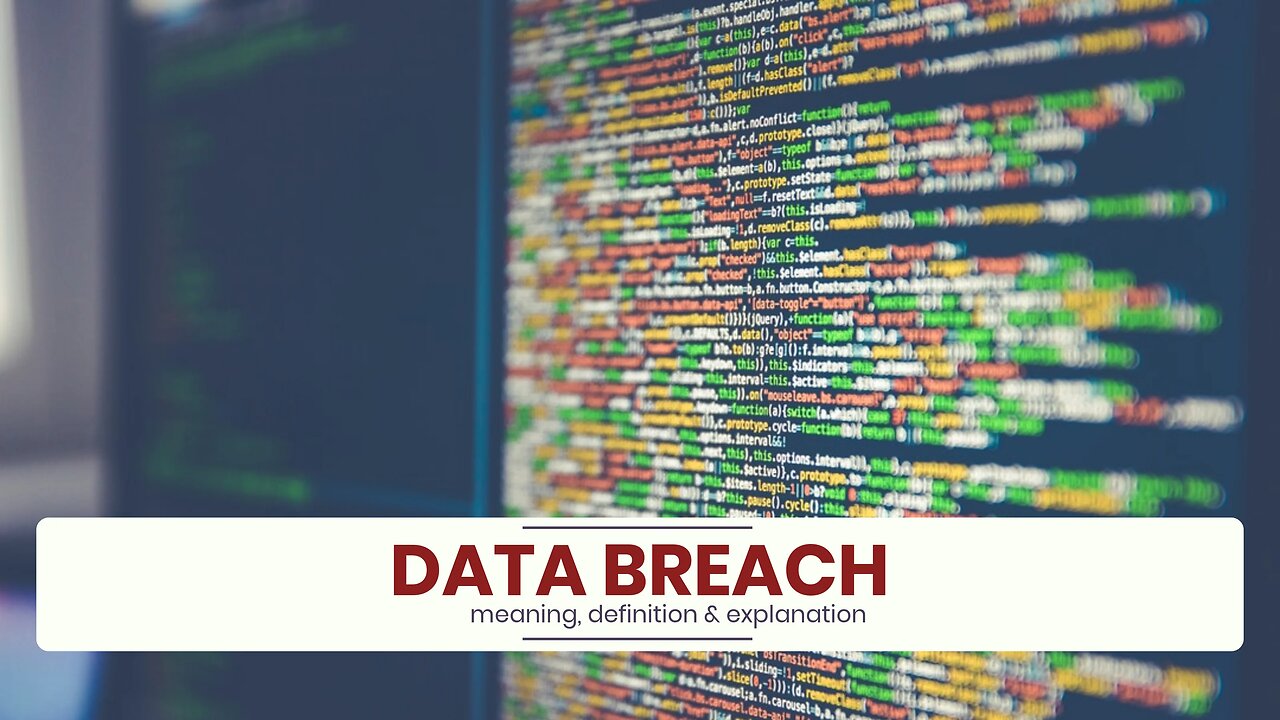Premium Only Content

What is DATA BREACH?
✪✪✪✪✪
http://www.theaudiopedia.com
✪✪✪✪✪
What does DATA BREACH mean? DATA BREACH meaning - DATA BREACH definition - DATA BREACH explanation. What is the meaning of DATA BREACH? What is the definition of DATA BREACH? What does DATA BREACH stand for? What is DATA BREACH meaning? What is DATA BREACH definition?
A data breach is the intentional or unintentional release of secure or private/confidential information to an untrusted environment. Other terms for this phenomenon include unintentional information disclosure, data leak and also data spill. Incidents range from concerted attack by black hats associated with organized crime, political activist or national governments to careless disposal of used computer equipment or data storage media.
Definition: "A data breach is a security incident in which sensitive, protected or confidential data is copied, transmitted, viewed, stolen or used by an individual unauthorized to do so." Data breaches may involve financial information such as credit card or bank details, personal health information (PHI), Personally identifiable information (PII), trade secrets of corporations or intellectual property. Most data breaches involve overexposed and vulnerable unstructured data - files, documents, and sensitive information.
According to the nonprofit consumer organization Privacy Rights Clearinghouse, a total of 227,052,199 individual records containing sensitive personal information were involved in security breaches in the United States between January 2005 and May 2008, excluding incidents where sensitive data was apparently not actually exposed.
Many jurisdictions have passed data breach notification laws, requiring a company that has been subject to a data breach to inform customers and take other steps to remediate possible injuries.
This may include incidents such as theft or loss of digital media such as computer tapes, hard drives, or laptop computers containing such media upon which such information is stored unencrypted, posting such information on the world wide web or on a computer otherwise accessible from the Internet without proper information security precautions, transfer of such information to a system which is not completely open but is not appropriately or formally accredited for security at the approved level, such as unencrypted e-mail, or transfer of such information to the information systems of a possibly hostile agency, such as a competing corporation or a foreign nation, where it may be exposed to more intensive decryption techniques.
ISO/IEC 27040 defines a data breach as: compromise of security that leads to the accidental or unlawful destruction, loss, alteration, unauthorized disclosure of, or access to protected data transmitted, stored or otherwise processed.
The notion of a trusted environment is somewhat fluid. The departure of a trusted staff member with access to sensitive information can become a data breach if the staff member retains access to the data subsequent to termination of the trust relationship. In distributed systems, this can also occur with a breakdown in a web of trust.
Most such incidents publicized in the media involve private information on individuals, i.e. social security numbers, etc.. Loss of corporate information such as trade secrets, sensitive corporate information, details of contracts, etc. or of government information is frequently unreported, as there is no compelling reason to do so in the absence of potential damage to private citizens, and the publicity around such an event may be more damaging than the loss of the data itself.
Although such incidents pose the risk of identity theft or other serious consequences, in most cases there is no lasting damage; either the breach in security is remedied before the information is accessed by unscrupulous people, or the thief is only interested in the hardware stolen, not the data it contains. Nevertheless, when such incidents become publicly known, it is customary for the offending party to attempt to mitigate damages by providing to the victims subscription to a credit reporting agency, for instance, new credit cards, or other instruments. In the case of Target, the 2013 breach cost Target a significant drop in profit, which dove an estimated 40 percent in the 4th quarter of the year.
The Yahoo breach disclosed in 2016 may be one of the most expensive today. It may lower the price of its acquisition by Verizon by $1 billion. Cybercrime cost energy and utilities companies an average of $12.8 million each year in lost business and damaged equipment according to DNV GL, an international certification body and classification society based in Norway. Data breaches cost healthcare organizations $6.2 billion in the last two years (presumably 2014 and 2015), according to a Ponemon study.
-
 1:52
1:52
The Audiopedia
1 year agoWhat is EXECUTIVE DIRECTOR?
591 -
 1:08:34
1:08:34
Jeff Ahern
2 hours agoThe Sunday Show with Jeff Ahern
8.85K5 -
 4:41
4:41
Sean Unpaved
1 hour agoNFL Week 8 Eye Openers
9.5K1 -
 25:57
25:57
The Kevin Trudeau Show Limitless
4 days agoThe Sound Of Control: This Is How They Program You
83.2K26 -
 LIVE
LIVE
GritsGG
5 hours agoQuads Win Streak Record Attempt 28/71 ! Top 70! Most Wins in WORLD! 3744+!
167 watching -
 LIVE
LIVE
Astral Doge Plays!
4 hours agoLuigi's Mansion 2 ~LIVE!~ Haunted Towers
64 watching -
 37:00
37:00
Tactical Advisor
3 hours agoNew Budget Honeybadger/Glock Discontinues All Models | Vault Room Live Stream 043
84.7K3 -
 LIVE
LIVE
TheItalianCEO
4 hours agoLast stream before Dreamhack
80 watching -
 LIVE
LIVE
Cripiechuccles
1 hour ago😁18+💚💙SUNDAY FUNDAY WITH CRIPIE💚RUMLUV💙👌SMOKING, GAMING & WATCHING FLICKS!:😁
25 watching -
 LIVE
LIVE
DoldrumDan
2 hours agoSACRED SEKIRO DAY 6 FIRST PLAYTHROUGH - DAY 24 NEW LIFE
9 watching